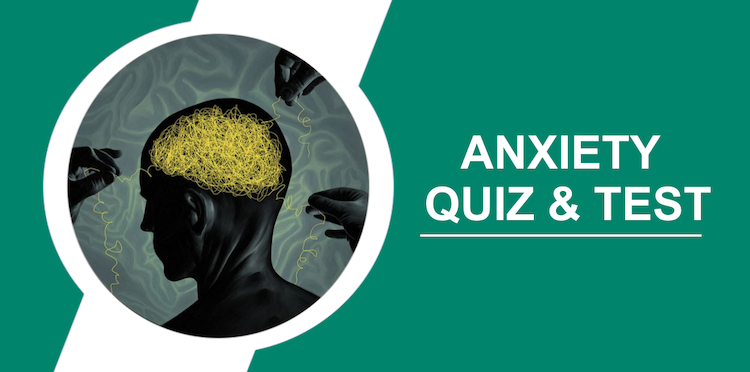
Time’s up
If you are wondering, “Do I have anxiety?” and want to know, you have come to the right place. Take our “Do I have Anxiety quiz” above and check out all the other information about Anxiety Check in the section below.
You’re preparing for that important school test or job interview, and the sweat just won’t stop. Your heart feels like it’s going to burst out of your chest, and you feel nauseous, as if you’re going to collapse at any moment.
This is anxiety – it’s natural to feel this way in these situations.
However, if the anxiety becomes overwhelming and interferes with your daily activities, it could be a sign of an anxiety disorder.
Usually, feelings of anxiety are fleeting, momentary, or specific. But with an anxiety disorder, the unsettling feelings and fears may persist.
If you’re worried about anxiety, know that you’re not alone.
Anxiety disorders manifest differently in different people, and symptoms can change depending on what or who triggers your anxiety. There are several types of anxiety disorders, each with its own set of symptoms and associated negative thoughts. These disorders include:
- Specific phobias
- Generalized anxiety disorder
- Panic disorder
- Separation Anxiety Disorder
- Social Anxiety Disorder
Conditions, like compulsive disorder (OCD) and post traumatic stress disorder (PTSD) can exhibit symptoms of anxiety but they are not categorized as anxiety disorders.
Although the cause or subject of your anxiety may vary, there are strategies for managing your anxiety.
The initial step, in dealing with your anxiety is to assess whether you might be experiencing an anxiety disorder or if there are other underlying factors contributing to your symptoms.
You may find it helpful to discuss your anxiety with a health care professional. They can help determine the source of your symptoms and refer you to a mental health professional if needed.
Do i have Anxiety Quiz - Who is this for?
Are you someone who thinks you may be experiencing signs of anxiety? We have created a short and concise survey for people in this situation.
The following items are designed to help you determine if you may need further help and professional guidance regarding your symptoms.
A mental health professional can help you determine if your challenges are manifestations of an anxiety disorder and suggest appropriate treatment if needed.
How reliable is our “Do I have anxiety” quiz?
Our “Do i have Anxiety quiz” is NOT a 100% accurate diagnosis. Only licensed mental health professionals can formally diagnose a mental illness.
However, you have the option to utilize this assessment as a means of self monitoring your emotional states. Additionally, it can serve as evidence for your doctor, showcasing any fluctuations in symptoms between appointments.
In order to determine the best course of action for you, it’s important to consult with a qualified health professional, such as a physician or mental health professional.
You Are Not Alone
As per the Anxiety and Depression Association of America (ADAA), specific phobias are the most common anxiety disorder in the U.S., affecting approximately 19 million U.S. adults.
Anxiety disorders are even more prevalent in children, affecting approximately one-quarter of those between the ages of 13 and 18 in the United States.
In addition, nearly half of those diagnosed with depression – which includes 17.3 million adults ages 18 and older in the U.S. and a staggering 264 million people worldwide – also receive a diagnosis of anxiety.
When you start to feel isolated or have doubts about whether others understand, find solace in the fact that you are part of the 1 in 13 individuals globally who experience anxiety, as reported by the World Health Organization (WHO). This implies that there are hundreds of millions of people out there who truly comprehend what you’re going through!
We understand that this is primarily a psychological burden. Therefore, we recommend that you start with our “Do I have Anxiety Quiz” to get a little understanding of whether or not you have an anxiety problem.
How Do I Get Tested for Anxiety?
 Although online tests such as our “Do i have Anxiety Quiz” can be helpful in understanding your emotions, it is important to obtain a professional assessment to ensure accuracy. It is recommended that you consult a physician or mental health professional, such as a psychiatrist, psychologist, or licensed clinical social worker.
Although online tests such as our “Do i have Anxiety Quiz” can be helpful in understanding your emotions, it is important to obtain a professional assessment to ensure accuracy. It is recommended that you consult a physician or mental health professional, such as a psychiatrist, psychologist, or licensed clinical social worker.
According to NYU Langone, when an adult seeks an anxiety assessment from a healthcare provider, it typically involves a comprehensive evaluation that includes a physical examination and detailed discussion of symptoms and medications taken. The purpose of this evaluation is to identify possible causes of anxiety, such as medication side effects or underlying physical conditions such as hypothyroidism.
Once physical or medication-related causes have been ruled out, the healthcare provider will conduct a psychological evaluation. This includes further questioning about the symptoms, their duration, and their pattern (persistent or intermittent), as well as exploring any family history of anxiety or depression. In addition, this evaluation may help identify other conditions that may coexist with anxiety disorders, such as PTSD or eating disorders.
Can I get an anxiety diagnosis from an online mental health provider?
Although our “Do I have Anxiety Quiz” can help you determine if you have symptoms of an anxiety disorder, it is recommended that you speak with a health care professional. This is important to identify or rule out physical causes for your symptoms and to ensure appropriate treatment. Only a qualified healthcare professional can make an accurate diagnosis and develop an appropriate treatment plan.
How Is Anxiety Treated?
There are several strategies for effectively managing anxiety disorders. These include learning about anxiety, practicing mindfulness, using relaxation techniques, learning proper breathing techniques, making dietary adjustments, engaging in physical activity, developing assertiveness skills, building self-confidence, participating in cognitive therapy sessions, undergoing exposure therapy treatments, using structured problem-solving approaches, considering medication options when appropriate, and seeking support from relevant groups. The first step may even be to take a simple “do I have anxiety quiz” to get some clues.
Do I Have Anxiety FAQs
What exactly is an anxiety disorder?
While we all experience moments of anxiety, anxiety disorders go beyond temporary worries or fears. An anxiety disorder involves persistent, overwhelming feelings of anxiety, apprehension, or fear that are of such magnitude that they disrupt an individual’s daily life. Individuals with anxiety disorders endure stress that is disproportionate to the subject of their concern and find it difficult to put aside these pessimistic thoughts. They may maintain a constant state of tension and nervousness, even when uncertain about the cause of their anxiety.
What are some of the different types of anxiety?
There are various forms of anxiety disorders, including conditions such as generalized anxiety disorder, social anxiety disorder, panic disorder, agoraphobia, separation anxiety disorder, and a number of specific phobias. Specific phobias can take many forms, such as pteromerhanophobia (fear of flying), claustrophobia (fear of enclosed spaces), and arachnophobia (fear of spiders).
How many “Do I Have Anxiety Quizzes Should I Take?
It is recommended that you take 1-3 different “Do I have anxiety” quizzes to get an idea. It is important that you are honest with yourself and answer all questions correctly. Then process the answers and results you receive and take the next steps if necessary.
How do I know if I have anxiety or not?
Feeling anxious is a reaction to various situations in life that can make you feel uncomfortable, challenged, or under pressure. It’s normal to feel anxious. However, if you find yourself dealing with anxiety that feels overwhelming, unrelenting, and interferes with your daily activities, it could be a sign of an anxiety disorder. It is always a good idea to see a health care professional to determine if your symptoms meet the criteria for a formal diagnosis.
Why do I have anxiety and fear in my life?
The causes of anxiety and anxiety disorders are complex. It is likely that a mix of genetic predisposition and environmental influences contribute to why some people are more susceptible to anxiety than others. Certain events, emotions, or life experiences can increase the likelihood that anxiety symptoms will occur or worsen – these are called triggers. In addition, anxiety can sometimes co-occur with certain physical health conditions. Anxiety triggers can lead to panic attacks in some people, and they can vary from person to person. Working with a mental health professional to identify your specific triggers and develop effective coping strategies when confronted with them can be extremely beneficial.
How do I deal with my anxiety?
Anxiety management can be approached in a variety of ways, and it may be beneficial to integrate a number of strategies. Individuals diagnosed with an anxiety disorder often find that a combination of psychotherapy and medication can provide significant benefits. For those who experience occasional anxiety, there are a variety of relaxation techniques that can help alleviate feelings of anxiety or distress. Methods such as controlled breathing exercises, meditation, and progressive muscle relaxation are a few examples worth exploring. In addition, seeking distraction, engaging in physical activity, and confiding in a trusted person are all valuable options for alleviating everyday anxiety. An initial test, such as taking a “Do I have Anxiety quiz” may also provide some initial relief.
What kind of medications are used in the treatment of anxiety disorders?
There are medications used for the treatment of generalized anxiety disorder that include antidepressants (such as SSRIs and SNRIs), buspirone, and benzodiazepines. It is always advisable to discuss the benefits, risks, and possible side effects of anxiety medications with your doctor or mental health professional.
How can I treat anxiety with CBD oil?
Early CBD research shows promise in alleviating anxiety, although further human studies focused on generalized anxiety disorder are needed for definitive confirmation. Consult your physician to determine an appropriate starting dosage of CBD. While generally safe, CBD may cause side effects such as diarrhea, fatigue, and appetite changes, and may interact with certain medications or supplements. One case study involving a minor under the age of 18 suggests that CBD may be a safe alternative to conventional psychiatric medications for anxiety and insomnia.
What is social anxiety disorder?
Social anxiety disorder is a persistent mental health problem characterized by irrational fears during social interactions. It goes beyond simple shyness to include an intense fear of being scrutinized, judged, embarrassed, or rejected by others. These symptoms are severe, disrupting daily life and preventing participation in regular activities.
How can I help someone who is experiencing anxiety?
Recognizing the symptoms of anxiety can help you support someone in distress. Common signs include avoidance of feared situations (e.g., children’s refusal to go to school), seeking reassurance, second-guessing, irritability, and catastrophizing. Avoid dismissing their feelings; instead, be a compassionate listener, express concern, and acknowledge their struggle. Encourage them to see a mental health professional or at least take a test like our Do I Have Anxiety Quiz.
Mark Willson, holding a Ph.D., functions as a psychotherapist in Washington, D.C. His specialized fields encompass addiction, anxiety, depression, as well as sexuality and interpersonal connections. Dr. Willson holds the distinction of being a diplomat for the American Board of Addiction and Anxiety, further serving as a certified counselor and addiction specialist.
Aside from his personal professional endeavors, Dr. Wilson has engaged in roles as an author, journalist, and creator within substantial medical documentary projects.
Isabella Clark, Ph.D., held the position of a professor within Emory University’s School of Medicine, working in the Department of Mental Health and Nutrition Science. Alongside this role, she served as a research associate affiliated with the National Research Center. Dr. Clark’s primary area of research centers on comprehending the mechanisms through which adverse social encounters, encompassing prolonged stress and traumatic exposure, contribute to a spectrum of detrimental mental health consequences and coexisting physical ailments like obesity. Her specific focus lies in unraveling the reasons behind the varying elevated susceptibility to stress-linked disorders between different genders.




